人教版英语八年级上册 Unit 7-专题讲解:掌握moreless,morefewer的用法
人教版八年级上册英语第七单元重点知识总结讲解学习
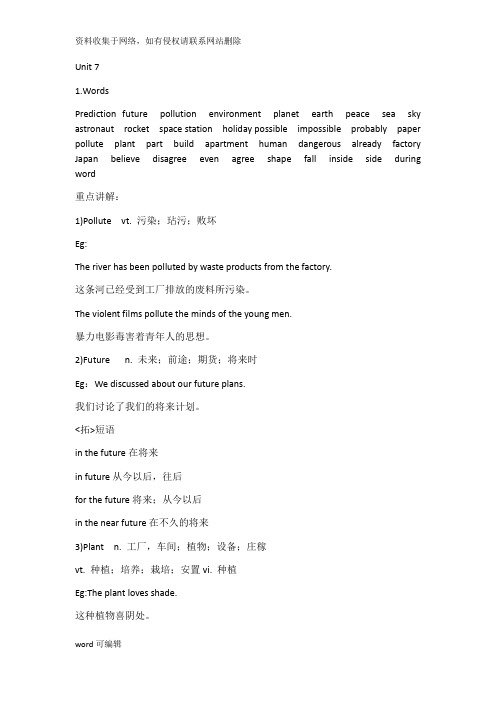
Unit 71.WordsPrediction future pollution environment planet earth peace sea sky astronaut rocket space station holiday possible impossible probably paper pollute plant part build apartment human dangerous already factory Japan believe disagree even agree shape fall inside side during word重点讲解:1)Pollute vt. 污染;玷污;败坏Eg:The river has been polluted by waste products from the factory.这条河已经受到工厂排放的废料所污染。
The violent films pollute the minds of the young men.暴力电影毒害着青年人的思想。
2)Future n. 未来;前途;期货;将来时Eg:We discussed about our future plans.我们讨论了我们的将来计划。
<拓>短语in the future 在将来in future 从今以后,往后for the future 将来;从今以后in the near future 在不久的将来3)Plant n. 工厂,车间;植物;设备;庄稼vt. 种植;培养;栽培;安置vi. 种植Eg:The plant loves shade.这种植物喜阴处。
This map shows the layout of the plant.这张图展示了工厂的布局。
She moistened the soil round the plant.她把植物周围的土壤弄湿。
Unit7(单元解读课件)八年级英语上册(人教版)
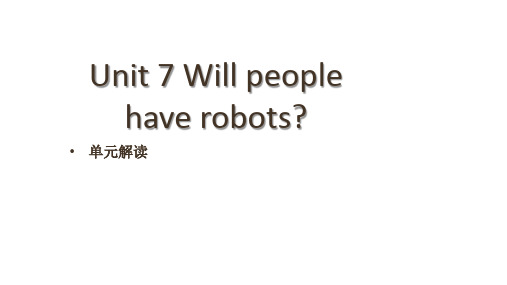
B 3a- 务
self
check
3a-3c活动旨在训练学生对本单元 语言的运用。
3a让学生补全一段“预测个人未 来生活”的短文,为后面的语言 输出做示范和铺垫。
3b让学生结合自身的实际情况, 用表格的方式整理信息,预测自 己20年后的生活,为后续写作活 动做好内容方面的准备。
3c要求学生仿照3a的短文,使用 本单元目标语言,将3b表格中整 理的信息写成一篇短文,对自己 20年后的生活进行预测。
构等提高听说技能;通过寻读、略读等方法掌握语篇信息,
提高阅读技能;运用写作技能,提升写作能力
思维品质
通过听说读看写等训练,能够准确获取有关预测未来等方
面的信息,学会与人探讨、交流和表达自我观点和看法,
在此基础上联系自身实际,有逻辑、辩证地、创新性地表
3
达个人看法,实现知识与思维能力的迁移
学习能力
通过预测未来,激发对英语语言文化的兴趣;通过听、说、
Section A 2a-2c Students' predictions about the future urban environment 02
Section B 1a-1d The protagonist talks about his past, present,
04
and future life
掌握机器人现代
dangerous,
获得对文章的整体理解;2c旨在让学生 发展程度,了解 possible,
便在后续 的写作中 能准确、 灵活地运
通过细读获取文中有关机器人的现在状 科技发展的日新 impossible; 用该时态。
况的细节信息;2d既关注信息,又关注 语言,让学生在已熟悉的语境中练习语
Unit 7 单元知识速记-八年级上册英语核心知识归纳精练一遍过(人教新目标)
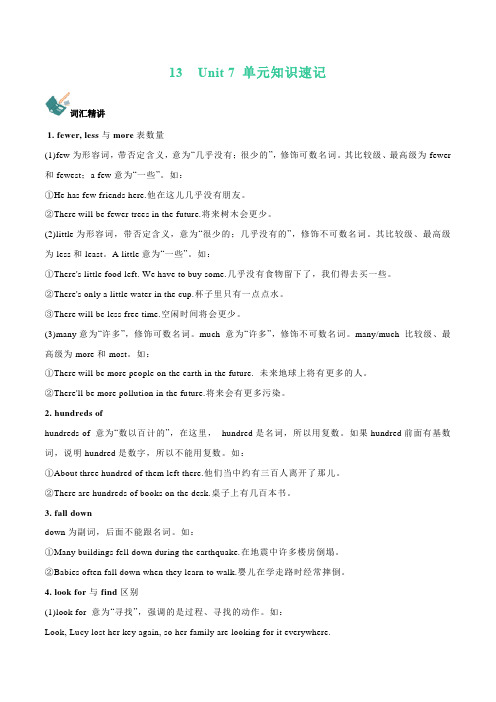
13 Unit 7 单元知识速记词汇精讲1. fewer, less与more表数量(1)few为形容词,带否定含义,意为“几乎没有;很少的”,修饰可数名词。
其比较级、最高级为fewer 和fewest;a few意为“一些”。
如:①He has few friends here.他在这儿几乎没有朋友。
②There will be fewer trees in the future.将来树木会更少。
(2)little为形容词,带否定含义,意为“很少的;几乎没有的”,修饰不可数名词。
其比较级、最高级为less和least。
A little意为“一些”。
如:①There's little food left. We have to buy some.几乎没有食物留下了,我们得去买一些。
②There's only a little water in the cup.杯子里只有一点点水。
③There will be less free time.空闲时间将会更少。
(3)many意为“许多”,修饰可数名词。
much 意为“许多”,修饰不可数名词。
many/much 比较级、最高级为more和most。
如:①There will be more people on the earth in the future. 未来地球上将有更多的人。
②There'll be more pollution in the future.将来会有更多污染。
2. hundreds ofhundreds of 意为“数以百计的”,在这里,hundred是名词,所以用复数。
如果hundred前面有基数词,说明hundred是数字,所以不能用复数。
如:①About three hundred of them left there.他们当中约有三百人离开了那儿。
②There are hundreds of books on the desk.桌子上有几百本书。
人教版英语八年级上册Unit7全单元 重点知识复习总结
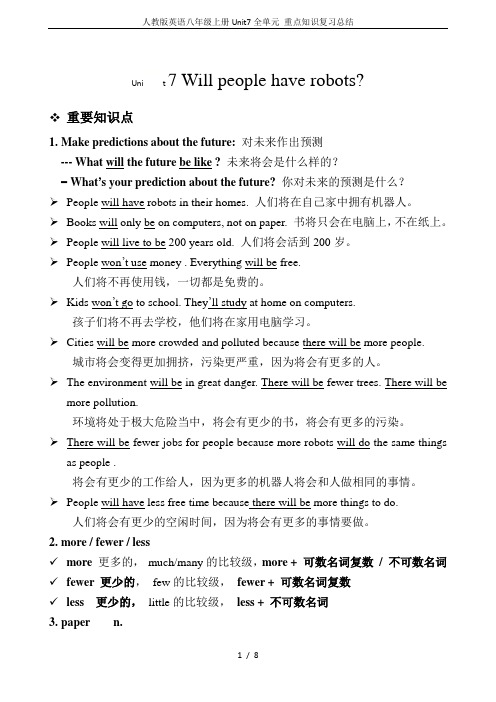
Uni t 7 Will people have robots?❖重要知识点1.Make predictions about the future: 对未来作出预测--- What will the future be like ? 未来将会是什么样的?= What’s your prediction about the future? 你对未来的预测是什么?➢People will have robots in their homes. 人们将在自己家中拥有机器人。
➢Books will only be on computers, not on paper. 书将只会在电脑上,不在纸上。
➢People will live to be 200 years old. 人们将会活到200岁。
➢People won’t use money . Everything will be free.人们将不再使用钱,一切都是免费的。
➢Kids won’t go to school. They’ll study at home on computers.孩子们将不再去学校,他们将在家用电脑学习。
➢Cities will be more crowded and polluted because there will be more people.城市将会变得更加拥挤,污染更严重,因为将会有更多的人。
➢The environment will be in great danger. There will be fewer trees. There will be more pollution.环境将处于极大危险当中,将会有更少的书,将会有更多的污染。
➢There will be fewer jobs for people because more robots will do the same things as people .将会有更少的工作给人,因为更多的机器人将会和人做相同的事情。
最全面人教版八年级上册英语第七单元知识点归纳总结
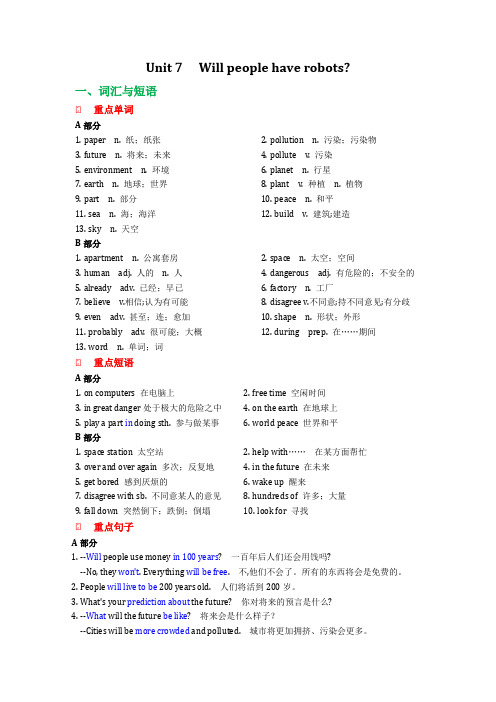
Unit 7 Will people have robots?一、词汇与短语● 重点单词A部分1.paper n. 纸;纸张2.pollution n. 污染;污染物3.future n. 将来;未来4.pollute v. 污染5.environment n. 环境6.planet n. 行星7.earth n. 地球;世界8.plant v. 种植n. 植物9.part n. 部分10.peace n. 和平11.sea n. 海;海洋12.build v. 建筑;建造13.sky n. 天空B部分1.apartment n. 公寓套房2.space n. 太空;空间3.human adj. 人的n. 人4.dangerous adj. 有危险的;不安全的5.already adv. 已经;早已6.factory n. 工厂7.believe v.相信;认为有可能8.disagree v.不同意;持不同意见;有分歧9.even adv. 甚至;连;愈加10.shape n. 形状;外形11.probably adv. 很可能;大概12.during prep. 在……期间13.word n. 单词;词● 重点短语A部分1.on computers 在电脑上2.free time 空闲时间3.in great danger处于极大的危险之中4.on the earth 在地球上5.play a part in doing sth. 参与做某事6.world peace 世界和平B部分1.space station 太空站2.help with……在某方面帮忙3.over and over again 多次;反复地4.in the future 在未来5.get bored 感到厌烦的6.wake up 醒来7.disagree with sb. 不同意某人的意见8.hundreds of 许多;大量9.fall down 突然倒下;跌倒;倒塌10.look for 寻找● 重点句子A部分1.--Will people use money in 100 years? 一百年后人们还会用饯吗?--No, they won't. Everything will be free. 不,他们不会了。
人教版八年级英语上册第七单元知识详解

人教版八年级英语上册第七单元知识详解考点扫描:人教版八年级英语上册第七单元知识详解一)习惯用语:take off 脱下 put on 穿上cut up 切碎turn on 打开 turn off 关掉turn down/ up把声音调小/大mix up混合在一起put…away 把…收起来put off 推迟,延期take away拿走a slice of bread 一片面包two teaspoons of honey 两汤匙蜂蜜two cups of yogurt 两杯酸奶a kilo of tomatoes 一公斤西红柿a piece of information/ paper/ news/ musicadd…to…把…加到…上pour…into… 倒…到…里put…in(into)…放…在(到)…里on the top 在顶部finally=at last 最后2 teaspoons of relish两茶匙调味品put…on...把……放到……上二)重点句型:1.Turn on the blender.打开果汁搅拌机。
2.Cut up the bananas.切开香蕉。
3.Pour the milk into the blender.将牛奶倒入果汁机里。
4.Put some relish on a slice of bread.将调味品涂到一片面包上。
5.Put the bananas and yogurt into the blender.将香蕉和酸奶倒人果汁机。
6.How do you make a banana milk shake?你如何做香蕉奶昔?7.First, put 1 teaspoon of mayonnaise on the sandwich.首先,在三明治上放一茶匙蛋黄酱。
三)交际用语:How do you make a banana milk shake?First,peel the bananas and cut them up.Then put the milk into the blender…How many bananas do we need? We need three bananas.四)主题写作:给你一些配料和步骤,要你写一篇...的制作说明.词语点击:1. cut:[k?t]1)及物动词 vt. 切;割;剪;削;砍;削减;缩短Please cut the cake into ten pieces. 请把蛋糕切成十块。
八年级英语上册第七单元重要知识点汇总(人教版)
八年级英语上册第七单元重要知识点汇总(人教版)八年级英语上册第七单元重要知识点汇总(人教版)短语:oncomputersonpaperlivetobe200yearsoldfreetime indangerontheearthplayapartinsthspacestation lookforcomputerprogrammerinthefuturehuandredsof thesame…asoverandoveragaingetboredwakeuplooklikefalldown用法:will+动词原形将要做fewer/more+可数名词复数更少/更多…less/more+不可数名词更少/更多trytodosth.尽力做某事havetodosth不得不做某事agreewithsb.同意某人的意见such+名词(词组)如此playapartindoingsth参与做某事makesbdosth让某人做某事helpsbwithsth帮助某人做某事Therewillbe+主语+其他将会有….Thereis/are+sb.+doingsth有…正在做…Itis+形容词+forsb+todosth做某事对某人来说…的Whatwillthefuturebelike?Citieswillbemorepolluted.Andtherewillbefewertr ees.Willpeopleusemoneyin100years?No,theywon’t.Everythingwil lbefree. Willtherebeworldpeace?Yes,Ihopeso. Kidswillstuffyathomeoncomputers.Theywon’tgotoschool.CountablenounsUncountablenounsTherewillbemorepeople.Therewillbemorepollution. Therewillbefewertrees.Therewillbelessfreetime.1.every与each的区别:every用来表整体,each用来表个别。
人教版八年级英语上册Unit7知识点归纳整理
人教版八年级英语上册Unit7知识点归纳整理Unit 7 Knowledge Points Summary (人教版八年级英语上册)Unit 7 of the People's Education Edition Grade 8 English textbook focuses on various knowledge points related to the theme "What's the highest mountain in the world?" In this unit, we will explore topics such as geographical features, comparison of adjectives, superlatives, definite and indefinite articles, and more. Let's go through these key points in a detailed manner.1. Geographical Features:- Mountains: We learn about the world's highest mountains, such as Mount Everest, K2, and Kangchenjunga. We understand how mountains are formed and their significance in shaping the Earth's landscape.- Rivers: We discuss major rivers, including the Nile, the Amazon, and the Yangtze. We examine their locations, lengths, and importance for human civilizations.2. Comparison of Adjectives:- Regular Adjectives: We review the formation of comparative and superlative forms of regular adjectives. For example:- Comparative: tall ➜ taller, interesting ➜ more interesting- Superlative: tall ➜ tallest, interesting ➜ most interesting- Irregular Adjectives: We study the comparison of irregular adjectives, such as good, bad, little, many, etc. For example:- Comparative: good ➜ better, bad ➜ worse, little ➜ less, many ➜more- Superlative: good ➜ best, bad ➜ worst, little ➜ least, many ➜ most3. Superlatives:- Superlative Adjectives: We learn to use superlative adjectives to compare three or more things. For example:- Everest is the highest mountain.- The Amazon is the longest river.- Superlative Adverbs: We also explore the use of superlative adverbs. For example:- The goods were manufactured most efficiently in that factory.- She spoke most fluently among all the participants.4. Definite and Indefinite Articles:- Definite Article "the": We understand when and how to use "the" before nouns. For example, we use "the" when referring to specific objects, unique items, or things previously mentioned.- The Eiffel Tower is a famous landmark.- I lost the key that you gave me yesterday.- Indefinite Article "a/an": We learn when to use "a" or "an" before countable singular nouns. For example, "a" is used before consonant sounds, while "an" is used before vowel sounds.- She bought a book about space travel.- He is an honest person.5. Expressing Opinions:- We practice expressing personal opinions using adjectives, adverbs, and comparative/superlative forms. For example:- I think Mount Everest is the most fascinating mountain.- In my opinion, the Amazon River is the most important river in the world.6. Using Comparatives in Context:- We apply comparative forms in various contexts, such as discussing prices, distances, and abilities. For example:- This laptop is cheaper than that one.- London is further north than Rome.- She runs faster than her sister.These knowledge points provide a comprehensive understanding of Unit 7 in the People's Education Edition Grade 8 English textbook. By mastering these concepts, students will be equipped with the necessary language skills to describe geographical features, compare objects, and express opinions confidently. With further practice and application, they will enhance theiroverall English competence, enabling them to communicate effectively in various situations.。
Unit7 sectionA 知识点讲解 人教版英语八年级上册
八年级上册Unit7Section A1.Will people have robots? 人们将会拥有机器人吗?➢will意为“将;将会”"will+动词原形” 用于一般将来时态的句子中表示将要发生的动作,常和表示将来的时间状语如tomorrow, next week ,from now on, in the future筹连用。
【例句】I think it will rain this evening.我想今晚会下雨。
【例句】We will come to see you next week.下周我们将会来看你。
【拓展】2. Do you think there will be robots in people's homes? 你认为人们的家里将会有机器人吗?➢there be句型的一般将来时There will be...是there be句型的一般将来时形式。
其否定句形式为There won't be...; 一般疑问句形式为“Will there be+其他?”一般疑问句的回答为Yes, there will. / No, there won't.【例句】In the future, there will be less fresh water.在将来,将会有更少的淡水。
【例句】There won't be a football match if it rains tomorrow.如果明天下雨,将不会有足球比赛。
【例句】——Will there be more trees in the future?将来会有更多的树吗?——Yes, there will. / No, there won't.是的,会有。
/ 不,不会[注意]There is/are going to be...是there be句型的一般将来时的另一种形式。
3. There will be (more/less/fewer) free time.将会有(更多的/更少的/更少的)空闲时间。
人教版初二英语八年级上册Unit7知识点
人教版初二英语八年级上册Unit7知识点Unit7 Will people have robots?【重点词语/短语用法解析】1.many+可数名词许多......much+不可数名词许多......2.live to be+基数词+ years old“活到...…岁”3. bein great danger 处在极大的危险中4.play a part in +名/代/V-ing. 参与某事/做某事Everyone should play a part in saving theearth.5.help (sb.) with sth. 帮助(某人)做某事He often helps me with my English.help sb. (to) do sth. 帮助(某人)做……He often helps me study English.help oneself ( to ) 自用(食物等)Help yourself to the fish. 请随便吃鱼6.the same as… 和……一样...... 反义短语:be different from7. It takes/took/will take sb. some time to do sth. 某人花了……时间做某事(时态根据具体情况决定)It takes me an hour to get to my office.spend time/moneyon sth. 在……上花费时间(金钱)sb. spend time/money (in) doing sth. 花费时间(金钱)做某事。
I spent two hours on this math problem. 这道数学题花了我个小时。
They spent two years building this bridge. 造这座桥花了他们两年时间。
8.hundreds of + 名词复数许多/大量......数词+hundred + 名词复数几百......类似的数词还有thousand(千), million(万)There are four hundred students in ourgrade.There are hundreds of tourists in Beijingevery year.9.during 在…期间during the vacation/the daytime/the weekend10.the meaning of …的意思Can you tell me the meaning of the words?【重点语法】一般将来时一、一般将来时的含义一般将来时表示将来某个时间要发生的动作或状态,或将来经常发生的动作或状态。
- 1、下载文档前请自行甄别文档内容的完整性,平台不提供额外的编辑、内容补充、找答案等附加服务。
- 2、"仅部分预览"的文档,不可在线预览部分如存在完整性等问题,可反馈申请退款(可完整预览的文档不适用该条件!)。
- 3、如文档侵犯您的权益,请联系客服反馈,我们会尽快为您处理(人工客服工作时间:9:00-18:30)。
单位名称
填写时间
2020.8.20
学科
初中英语
年级/册
八年级上册
教材版本
人教版
课题名称
Unit7.Will people have robots?
难点名称
掌握more/fewer;more/less的用法
难点分析
从知识角度分析为什么难
more和less本身对于学生来说是比较级的难点,而本课新增加了他们修饰名词的用法,more又比较特殊,所以讲清楚more和less的用法对老师的基本功是一个考验。所以我编了口诀来方便学生们记忆。
作形容词,根据more的原级引出many/much,用以解释他既可以修饰可数名词又可以修饰不可数名词
2.less的两种用法:
作副词,修饰部分双音节词和大部分多音节词adj/adv的比较级的修饰部分,举例呈现;
作形容词,根据less的原级引出little,用以解释它可以修饰不可数名词。
3.fewer 的一种用法
作形容词,根据fewer的原级引出few,用以解释它可以修饰可数名词。
最后总结出口诀
不可少less,
可少fewer,
可不可多more
课堂练习
(难点巩固)
分两个部分练习
1,选词填空。结合口诀和语境选择。
2,选择题,结合口诀和语境选择。
小结
知识如果知识一味的照搬,就会失去活力,在教学中要学会做有心人,善于学习,思考,所以口诀学习感叹句对于初中生来说很有意义和好处,最后请同学们将齐读口诀五遍。
教学环节
教学过程
导入
通过“Less is more”的翻译,让同学们分享对这句话的理解,引出more/Less/fewer的用法讲解。
知识讲解
(难点突破)
从中考考察感叹句的类型出发,分为两个部分
1.more的两种用法:
作副词,修饰部分双音节词和大部分多音节词adj/adv的比较级的修饰部分,举例呈现
从学生角度分析为什么难
学习总是有一个规律叫先入为主,很多学生刚掌握了比较级的用法,现在又要学习修饰名词,区分可数与不可数是一个难关,选择对的修饰词又是一个考验,并且还要根据句意选择,所以这个知识点对他们来说比较难。
难点教学方法
1.通过图片和例子直观演示more/less/fewer的用法
2.通过便口诀让学生熟练掌握,准确掌握和得分
